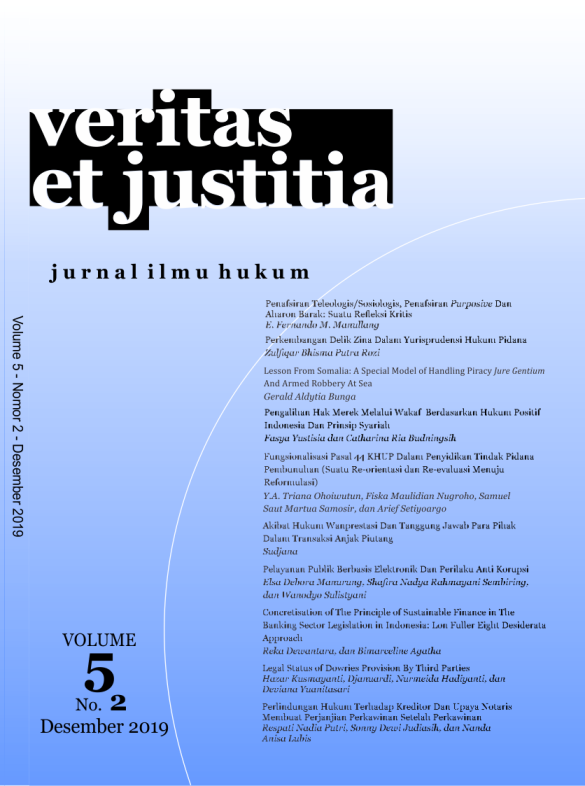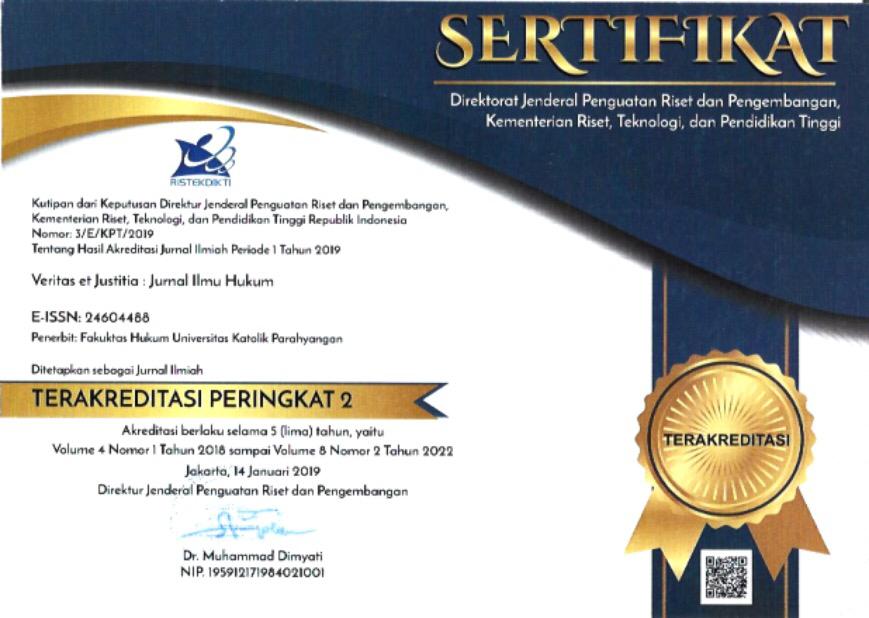PENGALIHAN HAK MEREK MELALUI WAKAF BERDASARKAN HUKUM POSITIF INDONESIA DAN PRINSIP SYARIAH
DOI:
https://doi.org/10.25123/vej.v5i2.3616Abstract
This article discusses the utilization of the Islamic institution of wakaf (an Islamic institution) to transfer ownership or right to use of trademark. The issue at hand is that method of trademark transfer is found regulated by Law No. 20 of 2016 re. Trademark and Geographical Indication whilst procedure and conditions of wakaf is regulated by Islamic/Syariah Law (Law No. 41 of 2004). The author notes that wakaf, understood as transfer of (ownership or proprietorship) of Trademarks, is or should be motivated by religious considerations or made in the public interest. Therefore, transfer done through wakaf will always be made in perpetuity. Nonetheless, the Law no. 41 of 2004 re. wakaf make possible temporary transfer of ownership which may be performed by a license agreement, transferring only right to use the trademark but not the ownership (title) thereof. Another important note to be highlighted is that Islamic law prohibits or considers not appropriate (not halal) trademark of living being or non-kosher products (goods or services).
References
Daftar Pustaka
Buku:
Athoillah, Hukum Wakaf (Wakaf benda Bergerak dan Tidak Bergerak dalam fiqih dan Peraturan Perundang-undangan di Indonesia), Yrama Widya, Bandung, 2014.
Faishal Haq., Hukum Perwakafan di Indonesia, PT Rajagrafindo Persada, Jakarta 2017.
Rahmi Jened, Hukum Merek (Trademark Law) Dalam Era Global dan Integrasi Ekonomi, PT Kharisma Putra Utama, Jakarta, 2015.
Kementerian Agama Republik Indonesia Direktorat Jenderal Bimbingan masyarakat Islamirektorat Pemberdayaan Wakaf, Dinamika Perwakafan di Indonesia dan Berbagai Belahan Dunia, Jakarta, 2015.
Schechter E. Roger dan Thomas R. John, Intellectual Property The Law of Copyrights, Patents and Trademarks, Thomson West, United States of America, 2003.
Jurnal:
Ali Amin Isfandiar, Tinjauan Fiqh Muamalat dan Hukum Nasional tentang Wakaf di Indonesia, Jurnal Ekonomi Islam, Vol. II No.1, 2008.
Joanna Schmidt-Szalewski, The International Protection of Trademark After the TRIPS Agreeement, vol 9 Duke Journal of Comparative International Law, 189-212, 1998. Tersedia pada https://scholarship.law.duke.edu/djcil/vol9/iss1/7, terakhir diakses 22 Juli 2019
Mahmud A Maghbub dan Abdulwahab Salem ALHAJAM, Proposal Framework of Waqf Institutions' Governance and Its Economic and Social Implications, International Journal Of Islamic Economics And Finance Studies, Vol. 4, No.2, 2018.
Muammar Alay Idrus, Keabsahan, Kepastian Hukum Dan Perlindungan Hukum Atas Perwakafan Yang Tidak Tercatat (Studi Kasus Praktek Perwakafan Tanah Di Kecamatan Sukamulia), Jurnal IUS Kajian Hukum dan Keadilan, Vol.5, No.1, 2017.
Nurfaizal, Prinsip-prinsip Muamalah dan Implementasinya Dalam Hukum Perbankan Indonesia, Jurnal Hukum Islam Fakultas Syariah dan Hukum UIN Sultan Syarif Kasim Riau, Vol. XIII No.1, 2013.
Septian Arief Budiman, Analisis Etika Profesi Akuntansi Perspektif Al-Quran, Jurnal Ilmiah Akuntansi Universitas Pamulang, Vol. 6 No. 1, 2018.
Syafaul Mudawam, Syari’ah-Fiqih-Hukum Islam Studi Tentang Konstruksi Pemikiran Kontemporer, Asy-Syir’ah Jurnal Ilmu Syari’ah dan Hukum, Vol. 46, No. II, 2012.
Skripsi:
Suswedi Yondra, 2013, “Analisa Terhadap Fatwa Yusuf Al-Qardhawi Tentang Profesi Fotografer Menurut Fiqh Muamalah”, Skripsi, Universitas Islam Negeri Sultan Syarif Kasim Riau
Internet:
Almanhaj, Kaidah Ke-50: Hukum Asal Mu’âmalah Adalah Halal Kecuali Ada Dalil Yang Melarangnya, https://almanhaj.or.id/4319-kaidah-ke-50-hukum-asal-muamalah-adalah-halal-kecuali-ada-dalil-yang-melarangnya-2.html, terakhir diakses 22 Juli 2019
DalamIslam.com, Larangan Minuman Keras Dalam Islam, https://dalamislam.com/akhlaq/larangan/larangan-minuman-keras-dalam-islam, terakhir diakses 22 Juli 2019
Marzuki, Tinjauan Umum Tentang Hukum Islam, http://staffnew.uny.ac.id/upload/132001803/lainlain/Dr.+Marzuki,+M.Ag_.+Tinjauan+Umum+tentang+Hukum+Islam.pdf, terakhir diakses 11 April, 2018
Salam Dakwah, Menggambar Kepala Makhluq Bernyawa Tanpa Mata, Hidung (Muka Rata)?, diakses dari http://www.salamdakwah.com/baca-pertanyaan/menggambar-kepala-makhluq-bernyawa-tanpa-mata--hidung---muka-rata-.html, terakhir diakses 22 April 2018
Tafsirq, Surat Al-Baqarah ayat 173, https://tafsirq.com/2-al-baqarah/ayat-173, terakhir diakses 12 April 2018
Yulian Purnama, Hukum Menggambar mahkluk Bernyawa, https://muslim.or.id/26684-hukum-menggambar-makhluk-bernyawa.html, terakhir diakses 26 Maret 2018
ZA Diana, Ketentuan Umum Tentang Wakaf, http://eprints.walisongo.ac.id/1860/3/092111079_Bab2.pdf, terakhir diakses 13 Maret, 2018
PERATURAN PERUNDANG-UNDANGAN:
Undang-Undang Nomor 20 Tahun 2016 Tentang Merek Dan Indikasi Geografis, Lembaran Negara Republik Indonesia Tahun 2016 Nomor 252, Tambahan Lembaran Negara Republik Indonesia Nomor 5953
Undang-Undang Nomor 41 Tahun 2004 Tentang Wakaf, Lembaran Negara Republik Indonesia Tahun 2004 Nomor 159, Tambahan Lembaran Negara Republik Indonesia Nomor 4459
Downloads
Published
Issue
Section
License
Authors who publish with this journal agree to the following terms:
Authors retain copyright and grant the journal right of first publication with the work simultaneously licensed under a Creative Commons Attribution License that allows others to share the work with an acknowledgement of the work's authorship and initial publication in this journal.
Authors are able to enter into separate, additional contractual arrangements for the non-exclusive distribution of the journal's published version of the work (e.g., post it to an institutional repository or publish it in a book), with an acknowledgement of its initial publication in this journal.
Authors are permitted and encouraged to post their work online (e.g., in institutional repositories or on their website) prior to and during the submission process, as it can lead to productive exchanges, as well as earlier and greater citation of published work.
The Journal allow the author(s) to hold the copyright and to retian publishing rights without restrictions.










